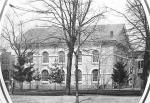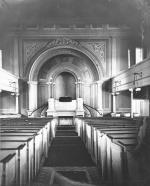![header=[Marker Text] body=[Oldest public building in Carlisle; erection begun, 1757. Here colonists met in 1774 to declare for independence, and George Washington worshipped, 1794. Congregation organized at Meeting House Springs in 1734.] sign](http://explorepahistory.com/kora/files/1/10/1-A-15D-139-ExplorePAHistory-a0a8n8-a_450.gif)
Mouse over for marker text
Name:
First Presbyterian Church
Region:
Hershey/Gettysburg/Dutch Country Region
County:
Cumberland
Marker Location:
NW corner, High & Hanover Sts., Carlisle
Dedication Date:
October 21, 1949
Behind the Marker
Before the American Revolution, Germans, Scots-Irish, and other settlers outside of Bucks, Chester, and Philadelphia counties had little to do with politics aside from protesting for greater defense on the frontier. To increase its influence in the Assembly, the Scots-Irish Presbyterians who dominated Cumberland County, in 1765, elected William Allen of Philadelphia, a leader of the Proprietary Party, as its representative, and kept him there until 1770, when a new law made it illegal for voters to elect a representative from outside of their county.
Without any sway in the Assembly, the Scots-Irish and a growing German population became disgruntled by the unwillingness of Philadelphia's provincial elites to provide for their defense against the Indians and the demands of the Assembly for the inhabitants of the frontier counties to pay a "more equitable share of taxes." The tension between Philadelphia's provincial elites and frontier settlers made it easy for Cumberland County's settlers to adopt the Revolutionary cause after the infamous Boston Tea Party of December 1773.
In response to the Bostonians' refusal to pay for the destroyed tea, Parliament passed a series of laws, collectively referred to as the "Intolerable Acts" by the colonists, that included suspension of the Massachusetts charter, closure of the port of Boston until the city paid for the tea that had been thrown into the harbor, the creation of special courts for maritime cases, and the use of private homes to quarter troops. Furious at these punishments, Boston leaders drafted a circular letter calling for an inter-colonial conference.
On May 19, 1774, Paul Revere delivered the letter to Philadelphia's radical and moderate leaders, who called a town meeting and drafted a reply proposing that Parliament rescind its punitive acts and that Boston pay for the tea it destroyed. They also encouraged Pennsylvania's backcountry settlers to organize their own resistance groups, variously called "committees of observation, inspection and safety."
Cumberland County was cautious in its response.
Many of its Scots-Irish patriots were Presbyterians who suspected that a new, more active British government would create a state church in America and require all colonists to pay a tax for its support. Gathering at the First Presbyterian Church, the Carlisle committee drafted seven resolutions that condemned the Intolerable Acts as "subversive of the rights and liberties" of all colonies, and resolved that "a congress of deputies from all colonies" meet to plan a course of action in response to those acts. The committee then selected representatives to that continental congress, all highly accomplished individuals with political experience at the local and/or provincial levels. At the same time, the Carlisle Committee suggested that if the key committee of correspondence at Philadelphia should prove too conservative, Cumberland County would look to "other provinces" for guidance.
Finally, the Carlisle meeting selected William Irvine, Robert Magaw, and James Wilson to meet with the members of other committees at Philadelphia to determine a course of action. At that conference, Wilson was chosen as one of eleven representatives to make recommendations to the conservative-controlled Provincial Assembly. While the Assembly adopted some of their suggestions, it chose no one from Cumberland, Bedford, or Westmoreland counties to serve at the First Continental Congress. Believing that the Assembly would neglect their interests, Carlisle's Committee of Correspondence requested, in the fall of 1774, that the county's voters select a Committee of Observation, like similar bodies created in response to the First Continental Congress's request to enforce the boycott of British goods.
James Wilson to meet with the members of other committees at Philadelphia to determine a course of action. At that conference, Wilson was chosen as one of eleven representatives to make recommendations to the conservative-controlled Provincial Assembly. While the Assembly adopted some of their suggestions, it chose no one from Cumberland, Bedford, or Westmoreland counties to serve at the First Continental Congress. Believing that the Assembly would neglect their interests, Carlisle's Committee of Correspondence requested, in the fall of 1774, that the county's voters select a Committee of Observation, like similar bodies created in response to the First Continental Congress's request to enforce the boycott of British goods.
With the outbreak of hostilities at Lexington and Concord, Massachusetts, in April 1775, Carlisle's Committee of Observation prepared for war. When the Assembly added James Wilson to the Second Continental Congress the following month, the western frontier finally secured a strong voice to represent their interests in the imperial crisis.
Without any sway in the Assembly, the Scots-Irish and a growing German population became disgruntled by the unwillingness of Philadelphia's provincial elites to provide for their defense against the Indians and the demands of the Assembly for the inhabitants of the frontier counties to pay a "more equitable share of taxes." The tension between Philadelphia's provincial elites and frontier settlers made it easy for Cumberland County's settlers to adopt the Revolutionary cause after the infamous Boston Tea Party of December 1773.
In response to the Bostonians' refusal to pay for the destroyed tea, Parliament passed a series of laws, collectively referred to as the "Intolerable Acts" by the colonists, that included suspension of the Massachusetts charter, closure of the port of Boston until the city paid for the tea that had been thrown into the harbor, the creation of special courts for maritime cases, and the use of private homes to quarter troops. Furious at these punishments, Boston leaders drafted a circular letter calling for an inter-colonial conference.
On May 19, 1774, Paul Revere delivered the letter to Philadelphia's radical and moderate leaders, who called a town meeting and drafted a reply proposing that Parliament rescind its punitive acts and that Boston pay for the tea it destroyed. They also encouraged Pennsylvania's backcountry settlers to organize their own resistance groups, variously called "committees of observation, inspection and safety."
Cumberland County was cautious in its response.
Many of its Scots-Irish patriots were Presbyterians who suspected that a new, more active British government would create a state church in America and require all colonists to pay a tax for its support. Gathering at the First Presbyterian Church, the Carlisle committee drafted seven resolutions that condemned the Intolerable Acts as "subversive of the rights and liberties" of all colonies, and resolved that "a congress of deputies from all colonies" meet to plan a course of action in response to those acts. The committee then selected representatives to that continental congress, all highly accomplished individuals with political experience at the local and/or provincial levels. At the same time, the Carlisle Committee suggested that if the key committee of correspondence at Philadelphia should prove too conservative, Cumberland County would look to "other provinces" for guidance.
Finally, the Carlisle meeting selected William Irvine, Robert Magaw, and
With the outbreak of hostilities at Lexington and Concord, Massachusetts, in April 1775, Carlisle's Committee of Observation prepared for war. When the Assembly added James Wilson to the Second Continental Congress the following month, the western frontier finally secured a strong voice to represent their interests in the imperial crisis.






